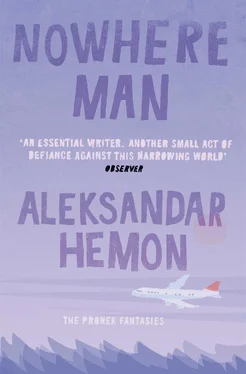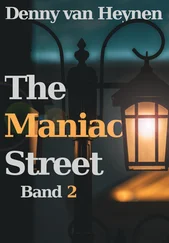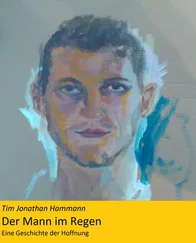Pronek stepped out of the car and walked toward the house. The number on the brass plate next to the door was 2345, and the orderliness of the digits seemed absurd against the scruffy house: blinds with holes, dusty windows, a mountain of soggy coupon sheets at the bottom of the stairs, blisters of paint on the faded-brown door with a red-letter sign reading NO TRESPASSING in its window. There was a squirrel sitting in an empty bird bath padded with damp leaves, watching him, with its little paws together, as if ready to applaud. Pronek walked up the stairs to the door, clenching the envelope, his heart steadily thumping. He pressed the hard bell-nipple, and heard a muffled, deep ding-dong. He looked toward Owen in the car, who looked back at him over the folded Sun-Times , with an eager pen in his hand. “If this is a detective novel,” Pronek thought, “I will hear shooting now.” He imagined going around the house, jumping over the wire fence, looking in, and seeing a body in the middle of a carmine puddle spreading all over the floor, a mysterious fragrance still in the air. Then running back to Owen, only to find him with a little powder-black hole in his left temple, his hand petrified under his armpit, too slow to save him. There was no doubt that he would have to find the killer and prove his own innocence. Maybe Mirza could come over and be his partner, they could solve the crime together. He rang the bell again. The squirrel moved to a better position and was sitting on a tree branch, watching him intently. “ Dobro jutro ,” Pronek muttered, rehearsing the first contact with Brdjanin. “ Dobro jutro. Evo ovo je za Vas. ” He would give him the envelope then, Brdjanin would take it, confused by the familiarity of the language. Piece of cake.
But then he heard keys rattling, the lock snapping, and a bare-chested man, with a beard spreading down his hirsute front and a constellation of brown birthmarks on his pink dome — a man said: “What?” Pronek stared at him paralyzed, his throat clogged with the sounds of dobro jutro.
“What you want?” The man had a piece of lint sticking out of his navel and a cicatrice stretching across his stomach.
“This is for you,” Pronek garbled, and handed him the envelope. The man snatched it out of Pronek’s hand, looked at it, and snorted.
Should’ve went the other way.
“You no understand nothing,” the man said, waving the envelope in front of Pronek’s face.
“I don’t know,” Pronek said. “I must give this to you.”
“Where you from?”
“I am,” Pronek said reluctantly, “from Ukraine.”
“Oh, pravoslavni brother!” the man exclaimed. “Come in, we drink coffee, we talk. I explain you.”
“No, thank you,” Pronek uttered. “I must go.”
“Come,” the man said growled, and grabbed Pronek’s arm and pulled him in. “We drink coffee. We talk.”
Pronek felt the disturbed determination of the man’s fingers on his forearm. The last thing he saw before he was sucked in the house by the man’s will was Owen getting out of the car with an unhappy, worried scowl on his face.
As Pronek was walking in Brdjanin’s onionesque wake, he saw a gun handle — gray with two symmetrical dots, like teeny beady eyes — peering out of his pants, which were descending down his butt. Brdjanin led him through a dark hall, through a couple of uncertainly closed doors, into a room that had a table in its center and five chairs summoned around it. On the lacy tablecloth, there was a pear-shaped bottle of reddish liquid with a wooden Orthodox cross in it. There were five shot glasses and a platoon of crushed McDonald’s bags surrounding it.
“Sit,” Brdjanin said. “Here.”
“I must go,” Pronek uttered, and sat down, facing a window. A fly was buzzing against the windowpane as if trying to cut through it with a minikin circular saw. There was an icon on the wall: a sad saint with a tall forehead and a triangular beard, his head slightly tilted under the halo weight, his hands touching each other gently.
“Sit,” Brdjanin said, and pulled the gun out of his ass, only to slam it on the table. The five glasses rattled peevishly. The window looked out at the garden: there was a shovel sticking out of the ground like a javelin, next to a muddy hole and a mound of dirt overlooking it. Brdjanin sat across the table from Pronek, and pushed the gun aside. “No fear. No problem,” he said, then turned toward the kitchen and yelled: “ Rajka, kafu!” He put the envelope right in front of himself, as if about to dissect it. “We talk with coffee,” he said.
A woman with a wrinkled, swollen face and a faint bruise on her cheek, like misapplied makeup, peeked in from the kitchen, pulling the flaps of her striped black-and-white bathrobe together, and then retreated. There was a din of drawers and gas hissing, ending with an airy boom.
“You Ukrainian,” Brdjanin said, and leaned toward him, as if to detect Ukrainianness in his eyes. “How is your name?”
“Pronek,” Pronek said, and leaned back in his chair.
“Pronek,” Brdjanin repeated. “Good pravoslav name. Pravoslavni brothers help Serbs in war against crazy people.”
Pronek looked at Brdjanin, whose beard had a smile crevice in the middle, afraid that a twitch on his face, or a diverted glance would blow his feeble cover. Brdjanin was staring at him enthusiastically, then pushed the envelope aside with contempt, leaned further toward Pronek, and asked fervently:
“You know what is this?”
“No,” Pronek said.
“Is nothing,” Brdjanin said, and thrust his right hand forward (the gun comfortably on his left-hand side), all his fingers tight together and his thumb erect, as if he were making a wolf hand-shadow. His thumb was a grotesque stump, like a truncated hot dog, but Pronek was cautious not to pay too much attention to it.
“You must understand,” Brdjanin said. “I was fool, budala. Wife to me was whore, was born here, but was Croat. Fifteen years. Fifteen years! I go see her brothers, they want to kill me.” He made the motion of cutting his throat with the thumb stump, twice, as if they couldn’t kill him on the first try. “They Ustashe, want to cut my head because I Serb. Is war now, no more wife, no more brothers. My woman is Serb now, you brother to me now. I trust only pravoslav people now. Other people, other people. .” He shook his head, signifying suspicion, and pulled his thumb across his throat again.
Pronek nodded automatically, helpless. He wanted to say that Croats are just like everyone else: good people and bad people, or some reasonable platitude like that, but in this room whatever it was he used to think just an hour ago seemed ludicrous now. He wanted the woman to be in the room with him, as if she could protect him from Brdjanin’s madness and his cutthroat thumb stump. The room reeked of coffee and smoke, stale sweat and Vegeta, a coat of torturous, sleepless nights over everything. The woman trudged out of the kitchen and put a tray with a coffee pot and demitasse between the two of them, and then dragged her feet back, as if she were ready to collapse. Pronek looked after her longingly, but Brdjanin didn’t notice. “This Serbian coffee. They say Turkish coffee. It’s Serbian coffee,” Brdjanin said, lit a cigarette and let two smoke-snakes out of his nostrils. Pronek imagined saving the woman from this lair, taking her home (wherever it may be) and taking care of her, until she recovered and regained her beauty, slouching somewhere in her heart now — and he would ask for nothing in return. Brdjanin slurped some coffee from his demitasse, then reached behind his chair and produced a newspaper. The headline said: THOUSANDS KILLED IN SREBRENICA.
Читать дальше












